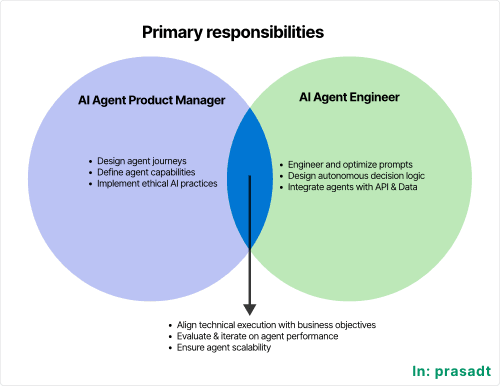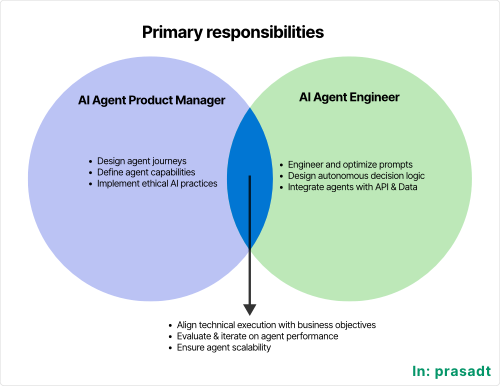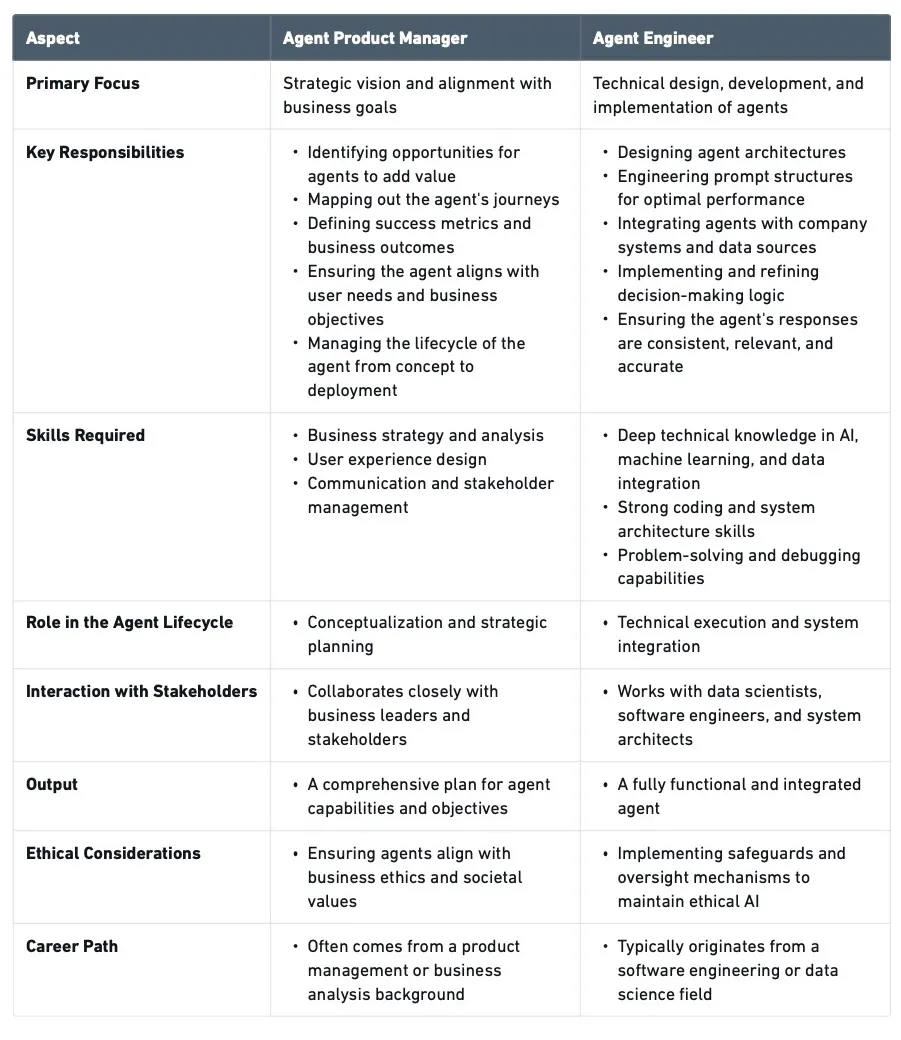The Rise of the AI Agent Product Manager and AI Agent Engineer


Imagine a future where Generative AI doesn't just respond to queries but proactively solves complex problems across every facet of business. This isn't science fiction; it's the rapidly approaching reality of Generative AI agents. These agents are poised to revolutionize companies' operations and inspire a new wave of innovation, from streamlining supply chains to optimizing product development and transforming customer interactions.
Having spent over a year building Generative AI applications and agents, I've seen firsthand how these technologies can profoundly reshape business processes. AI's potential is immense, from support agents that handle customer queries with unprecedented efficiency to autonomous agents that drive business operations and decision-making. These agents are not merely enhancing existing processes but enabling new ways of working.
For example, picture an agent that doesn't just schedule meetings but understands the context of your work, suggests the most impactful attendees, prepares briefing documents, and even proposes agenda items based on recent company developments. Or consider an agent in manufacturing that doesn't just monitor production lines but predicts maintenance needs, optimizes resource allocation in real-time, and collaborates with design teams to suggest product improvements based on production data.
This AI-driven transformation is creating a need for two pivotal roles: the AI Agent Product Manager and the AI Agent Engineer. These specialists are not just the architects and builders of our AI-augmented future, but integral parts of a collaborative team, working at the intersection of business strategy and cutting-edge technology.

Introducing the New Roles
The AI Agent Product Manager is a visionary who identifies opportunities for agents to create value, designs their capabilities, and ensures they align with business goals and user needs. They act as translators between the world of business and AI possibilities, orchestrating AI innovation.
The AI Agent Engineer, on the other hand, is the technical wizard who brings these agents to life. They design robust architectures, create sophisticated prompts, and ensure the agents are grounded in company data and processes by seamlessly integrating them with various systems and data sources.
Since we are still in the early stages of this technology cycle, these professionals are usually found at specialized AI consultancies or companies developing agent-building products like Salesforce. This allows them to bring best practices and industry innovations to each new project.
The AI Agent Product Manager: Orchestrating AI Innovation
As an Agent Product Manager, you may work on different use cases, such as a sales agent one month and an HR agent the next. Let's dive into what your role might look like:
As an Agent Product Manager, lets say you're tasked with developing an agent for a multinational manufacturing firm. Your first step is to lead a series of workshops with executives from various departments — operations, design, sales, and customer service. You're not just looking for incremental improvements; you're hunting for transformative opportunities, and you do this by fostering collaboration and understanding across the organization.
Through these discussions, you identify a game-changing possibility: an agent that can bridge customer feedback, product design, and manufacturing processes. This Agent would analyze customer reviews and support tickets, identify trending issues or desired features, and automatically generate design modification proposals. It would then simulate these changes' impact on manufacturing processes and costs.
As a product manager for agents, one of your primary responsibilities will be to map out the agents' journeys. It involves defining each step from the initial interaction to the final outcome, ensuring that everything aligns with the business goals. You will need to identify the key interactions the Agent will have, understand the context of these interactions, and determine the objectives each journey should achieve. You will also need to consider critical questions such as: How will the Agent prioritize customer feedback? How can it effectively present design suggestions to the engineering team? And what ethical considerations must be addressed when AI influences product decisions?
You'll work closely with stakeholders to define success metrics. For example, you may decide that the Agent should aim to reduce the time from identifying a product issue to implementing a fix by 50% while also increasing customer satisfaction scores.
As the project progresses, you ensure the agent delivers real business value. You might review both simulated and actual conversations between the AI and design teams, tweaking the Agent's communication style to better resonate with engineers. Or you could pore over data on how the Agent's suggestions have impacted product quality and customer satisfaction, looking for ways to improve its performance further.
Throughout this process, you're not just thinking about the Agent's current capabilities but its future potential. How could this Agent evolve to react to customer feedback and predict future market trends? Could it someday participate in brainstorming sessions with the product team, offering data-driven insights to fuel innovation?
Your Agent Product Manager role puts you at the forefront of business transformation. You're not just implementing a new tool; you're reshaping how entire organizations think, innovate, and operate in the age of AI.
The AI Agent Engineer: Crafting Intelligent and Reliable Systems
Now, let's switch gears and step into the role of an Agent Engineer on this same project:
Your challenge is to create an agent that can understand customer feedback, translate it into actionable design insights, and interface with manufacturing systems. This is no small feat — it requires a deep understanding of large language models, sophisticated prompt engineering, and robust system integration.
You begin by selecting an appropriate large language model as the foundation for your Agent. However, your real work lies in designing a comprehensive agent architecture that can reliably perform across many conversation journeys.
As an Agent Engineer, one of your primary focuses is creating and refining the Agent's prompt structure. You craft intricate prompts that effectively guide the model's behavior, ensuring it consistently provides relevant and accurate responses across various scenarios. This could involve developing a hierarchical prompt system that can handle everything from supervising multiple agents to navigating various journeys.
You will spend significant time evaluating agent behavior and output, refining the prompts and flows, and publishing a new version. You may even design and implement a rigorous testing framework that simulates thousands of potential conversation trajectories. Your goal is to ensure that the Agent's response is deterministic and aligns with the desired outcome for any given input.
For instance, you might create a suite of test cases that cover various types of customer feedback, from simple product issues to complex feature requests. You then methodically work through these cases, analyzing the Agent's responses and iterating on the prompt structure and decision-making logic to improve performance.
When you encounter edge cases where the Agent's behavior is inconsistent or suboptimal, you don't simply tweak the prompt. Instead, you dive deep into the Agent's decision-making process, adjusting the underlying logic and prompt structure to address these issues systematically.
Integration remains a crucial part of your role. You're designing APIs that allow the Agent to pull data from customer support databases, access product design files, and input data into manufacturing planning systems. But beyond just connecting systems, you're focused on ensuring the Agent can make intelligent decisions based on this integrated data.
Ethics and safety continue to be critical concerns. You implement robust safeguards and oversight mechanisms to ensure the AI doesn't suggest design changes that could compromise product safety. You also build features for explainability, so the AI can always show its reasoning for any suggestion, which is crucial for building trust with the engineers and designers working with the Agent.
Your role as an Agent Engineer involves creating a functional AI system and crafting an intelligent agent that can reliably and consistently drive innovation and efficiency across the entire product development and manufacturing process. This complex challenge puts you at the forefront of AI technology, shaping the future of how businesses operate in the AI age.
Ethical Considerations and the Power of Collaboration
As agents become more integral to businesses, Agent Product Manager and Agent Engineer roles will only grow in importance. These roles are not just about technical prowess or strategic insight — they demand a deep commitment to ethical considerations. As these agents influence significant business decisions, the professionals behind them must ensure that these systems are transparent, fair, and aligned with broader societal values.
The success of this agent relies heavily on the seamless collaboration between the Product Manager and Engineer. Together, you'll iterate on the Agent's capabilities, troubleshoot issues, and push the boundaries of what's possible.
Comparing the Roles: Agent Product Manager vs. Agent Engineer
Here's a summary comparison table to emphasize the differences between the Agent Product Manager and the Agent Engineer:

Key Takeaways:
- Agent Product Manager: This position focuses on the strategic and business aspects of agents, ensuring they deliver value and align with company goals.
- Agent Engineer: This position concentrates on technical implementation, ensuring agents function reliably and integrate seamlessly with existing systems.
The Future is Yours: Rise to the Challenge
As AI expands its influence, Agent Product Manager and Agent Engineer roles will be at the forefront of this technological revolution. Whether you're defining the strategy for an AI-driven business transformation or designing the intricate systems that power intelligent agents, you'll be shaping the future of business.
These roles require a unique blend of skills: strategic thinking, technical expertise, creativity, and a deep understanding of business and AI. They offer the chance to work on cutting-edge technology while driving tangible business impact.
So, future Agent Product Managers and Engineers, are you ready to rise to the challenge? The AI-augmented future is waiting for your expertise and vision. Whether you're drawn to the strategic aspects of product management or the technical intricacies of agent engineering, there's a place for you in this exciting new field. The question is not if AI will transform business, but how — and you could be the one to decide.